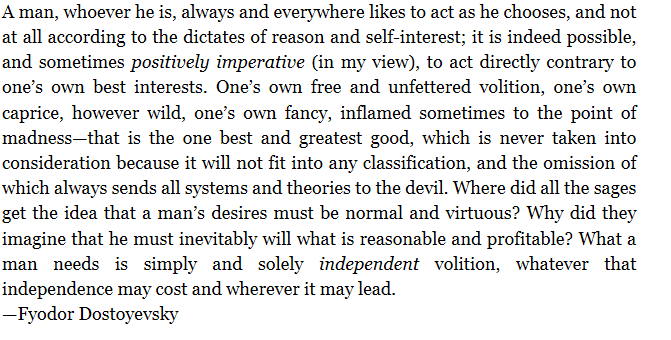S
smcder
Guest
Dostoyevsky on free will, two translations:
And all that for the most foolish reason, which, one would think, was hardly worth mentioning: that is, that man everywhere and at all times, whoever he may be, has preferred to act as he chose and not in the least as his reason and advantage dictated. And one may choose what is contrary to one's own interests, and sometimes one POSITIVELY OUGHT (that is my idea). One's own free unfettered choice, one's own caprice, however wild it may be, one's own fancy worked up at times to frenzy--is that very "most advantageous advantage" which we have overlooked, which comes under no classification and against which all systems and theories are continually being shattered to atoms. And how do these wiseacres know that man wants a normal, a virtuous choice? What has made them conceive that man must want a rationally advantageous choice? What man wants is simply INDEPENDENT choice, whatever that independence may cost and wherever it may lead. And choice, of course, the devil only knows what choice.

And all that for the most foolish reason, which, one would think, was hardly worth mentioning: that is, that man everywhere and at all times, whoever he may be, has preferred to act as he chose and not in the least as his reason and advantage dictated. And one may choose what is contrary to one's own interests, and sometimes one POSITIVELY OUGHT (that is my idea). One's own free unfettered choice, one's own caprice, however wild it may be, one's own fancy worked up at times to frenzy--is that very "most advantageous advantage" which we have overlooked, which comes under no classification and against which all systems and theories are continually being shattered to atoms. And how do these wiseacres know that man wants a normal, a virtuous choice? What has made them conceive that man must want a rationally advantageous choice? What man wants is simply INDEPENDENT choice, whatever that independence may cost and wherever it may lead. And choice, of course, the devil only knows what choice.

